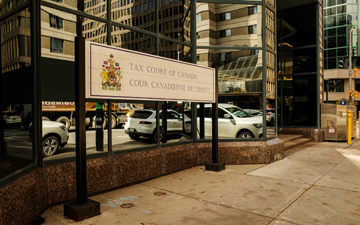Agreements must be in writing: Hutchings v. the King, a case of Covid-19 rent subsidies

Paper, not promises, matter when it comes to government subsidies to businesses during the pandemic, though verbal agreements are customary for some
Canada Emergency Rent Subsidy Lessons: Verbal Agreements Left Businesses Without Relief
 |
David J Rotfleisch, CPA, JD is the founding tax lawyer of Taxpage.com and Rotfleisch & Samulovitch P.C., a Toronto-based boutique tax law corporate law firm. |
The COVID-19 pandemic forced thousands of Canadian small businesses to close temporarily. To provide relief, the federal government introduced several subsidies, including the Canada Emergency Rent Subsidy (CERS), a program designed to help businesses, non-profits, and charities cover rent and other fixed property expenses. Under subsection 125.7(1) of the Income Tax Act, only rent paid under a written lease signed before October 9, 2020, qualified as an eligible expense. Organizations directly impacted by public health orders, such as hair salons, were also eligible for an enhanced top-up subsidy.
The decision of the Tax Court of Canada in Hutchings v. The King (2025 TCC 108) highlights the consequences of overlooking this requirement. The Court denied support to a long-standing business that had always paid rent on time but operated under a verbal lease, concluding that only written agreements qualified.
This case reinforces a critical lesson: in times of uncertainty, documenting agreements properly can mean the difference between accessing government relief and losing vital financial support.
Tax Court Reminder: Relief Programs Depend on Paper, Not Promises
Donna Hutchings operated a hair salon in Westport, Ontario, for over 40 years. Like many service businesses, she was forced to close during the pandemic due to public health restrictions. With the help of her sister, she applied for the Canada Emergency Rent Subsidy (CERS) and the top-up subsidy. Her request was granted, and she received a total of $3,640.83 in financial assistance distributed over several months.
In 2022, the Canada Revenue Agency reviewed her applications and determined that she was not eligible to receive the CERS because she did not meet the criteria for qualifying rent expenses. Hutchings argued that her verbal agreement with the property owners should be treated as binding in the same way as a written lease.
Her rental arrangement was entirely verbal, a customary practice in her small community of Westport. She believed that a handshake agreement was sufficient, but the CRA relied on subsection 125.7(1), which required that commercial rent be paid under a written lease entered into before October 9, 2020.
Why Evidence of Payment Was Not Enough
Ms. Hutchings even provided evidence of rent cheques that had been cashed. Still, the Court found this insufficient, holding that only obligations under a written agreement could qualify. While the Court expressed sympathy for her circumstances, it emphasized that it could not override Parliament's explicit requirement for a written lease.
Lessons from the Tax Court
The Court explained that Parliament never intended to extend the subsidy to verbal rental agreements, because it required proof that a lease existed when the subsidy came into force. As the judge noted, "I cannot change the law. I must apply it as enacted with this specific requirement."
The Court's reasoning made clear that relying on a long-standing verbal arrangement, without the protection of a written lease, fell short of the statutory requirement.
David J Rotfleisch, CPA, JD is the founding tax lawyer of Taxpage.com and Rotfleisch & Samulovitch P.C., a Toronto-based boutique tax law corporate law firm and is a Certified Specialist in Taxation Law who has completed the CICA in-depth tax planning course. He appears regularly in print, radio and TV and blogs extensively.
With over 30 years of experience as both a lawyer and chartered professional accountant, he has helped start-up businesses, cryptocurrency traders, resident and non-resident business owners and corporations with their tax planning, with will and estate planning, voluntary disclosures and tax dispute resolution including tax audit representation and tax litigation. Visit www.Taxpage.com and email David at david@taxpage.com.
Read the original article in full on Mondaq. Author photo courtesy Rotfleisch & Samulovitch P.C. Title image: Ottawa, Ontario, Canada - October 8, 2020: A sign for the Tax Court of Canada at 200 Kent Street in Ottawa, iStock ID 1283116731.











(0) Comments